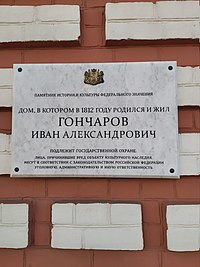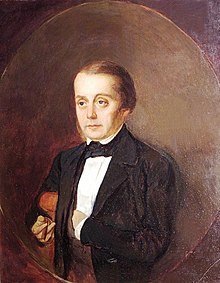Ivan Goncharov
Ivan Aleksandrovich Goncharov (/ˈɡɒntʃərɒf/ GON-chə-rof, US also /-rɔːf/ -rawf;[1] Russian: Ива́н Алекса́ндрович Гончаро́в, romanized: Iván Aleksándrovich Goncharóv, IPA: [ɪˈvan ɐlʲɪkˈsandrəvʲɪdʑ ɡənʲtɕɪˈrof]; 18 June [O.S.
Goncharov was born in Simbirsk into the family of a wealthy merchant; as a reward for his grandfather's military service, they were elevated to Russian nobility status.
Towards the end of his life Goncharov wrote a memoir called An Uncommon Story, in which he accused his literary rivals, first and foremost Ivan Turgenev, of having plagiarized his works and prevented him from achieving European fame.
His father, Aleksander Ivanovich Goncharov, was a wealthy grain merchant and a state official who served several terms as mayor of Simbirsk.
[4] Tregubov, a man of liberal views and a secret Masonic lodge member,[5] who knew some of the Decembrists personally, and who was one of the most popular men amongst the Simbirsk intelligentsia, was a major early influence upon Goncharov, who particularly enjoyed his seafaring stories.
One episode proved to be especially memorable: when his then-idol Alexander Pushkin arrived as a guest lecturer to have a public debate with professor Mikhail T. Katchenovsky on the authenticity of The Tale of Igor's Campaign.
[7] Unlike Alexander Herzen, Vissarion Belinsky or Nikolay Ogaryov, his fellow Moscow University students, Goncharov remained indifferent to the ideas of political and social change that were gaining popularity at the time.
[5] He became a member of the elitist literary circle based in the Maykovs' house and attended by writers like Ivan Turgenev, Fyodor Dostoyevsky and Dmitry Grigorovich.
[5][6] His first piece of prose appeared in an issue of Snowdrop, a satirical novella called Evil Illness (1838), ridiculing romantic sentimentalism and fantasizing.
Published in Sovremennik six years later, it failed to make any impact, being very much a period piece, but later scholars reviewed it positively, as something in the vein of the Nikolay Gogol-inspired genre known as the "physiological essay", marked by a fine style and precision in depicting the life of the common man in the city.
It dealt with the conflict between the excessive romanticism of a young Russian nobleman who has recently arrived in Saint Petersburg from the provinces, and the sober pragmatism of the emerging commercial class of the capital.
The novel was a direct response to Vissarion Belinsky's call for exposing a new type, that of the complacent romantic, common at the time; it was lavishly praised by the famous critic as one of the best Russian books of the year.
In this capacity, he helped publish important works by Ivan Turgenev, Nikolay Nekrasov, Aleksey Pisemsky, and Fyodor Dostoyevsky, a fact that brought resentment from some of his bosses.
The critic argued that, while several famous classic Russian literary characters – Onegin, Pechorin, and Rudin – bore symptoms of the 'Oblomov malaise', for the first time one single feature, that of social apathy, a self-destructive kind of laziness and unwillingness to even try and lift the burden of all-pervading inertia, had been brought to the fore and subjected to a thorough analysis.
"[10] A moderate conservative[11] at heart, Goncharov greeted the emancipation reform of 1861, embraced the well-publicized notion of the government's readiness to "be at the helm of [social] progress", and found himself in opposition to the revolutionary democrats.
[5] In this second term Goncharov proved to be a harsh censor: he created serious problems for Nekrasov's Sovremennik and Russkoye Slovo, where Dmitry Pisarev was now a leading figure.
Openly condemning 'nihilistic' tendencies and what he called "pathetic, imported doctrines of materialism, socialism, and communism", Goncharov found himself the target of heavy criticism.
[6] In 1867, Goncharov retired from his censorial position to devote himself entirely to writing The Precipice, a book he later called "my heart's child", which took him twenty years to finish.
Towards the end of this tormenting process Goncharov spoke of the novel as a "burden" and an "insurmountable task" that blocked his development and made him unable to advance as a writer.
[5] In 1869, The Precipice, a story of the romantic rivalry among three men, condemning nihilism as subverting the religious and moral values of Russia, was published in Vestnik Evropy.
While the latter "had been driven by ideas assimilated by its author from the best men of the 1840s", The Precipice featured "a bunch of people wandering to and fro without any sense of direction, their lines of action having neither beginning nor end," according to the critic.
Instead he became a prolific critic, providing numerous theater and literature reviews; his "Myriad of Agonies" (Milyon terzaniy, 1871) is still regarded as one of the best essays on Alexandr Griboyedov's Woe from Wit.
[6] Goncharov also wrote short stories: his Servants of an Old Age cycle as well as "The Irony of Fate", "Ukha" and others, described the life of rural Russia.
[6] Towards the end of his life Goncharov wrote an unusual memoir called An Uncommon Story, in which he accused his literary rivals, first and foremost Ivan Turgenev, of having plagiarized his works and prevented him from achieving European fame.




